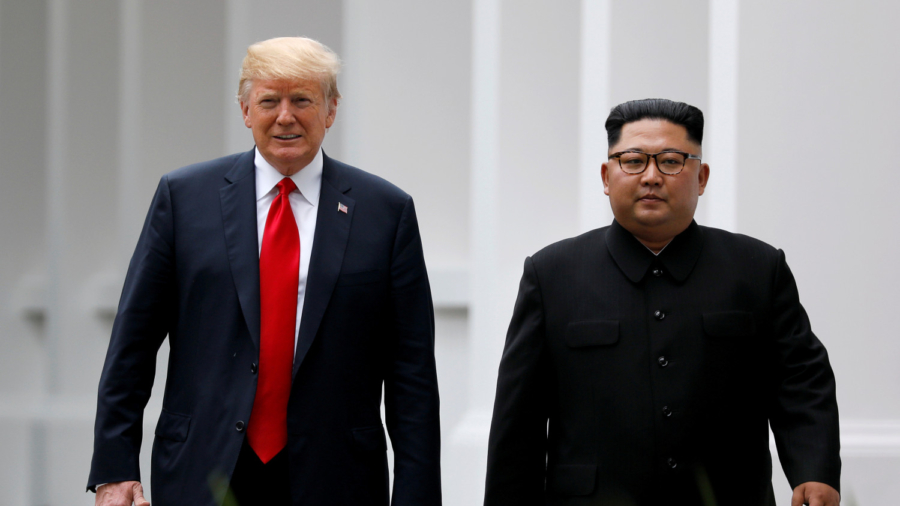WASHINGTON—Ahead of his second summit with North Korean Leader Kim Jong Un later this month in Vietnam, President Donald Trump voiced optimism, saying that the meeting would “be a very successful one.”
“I hope we have the same good luck as we had in the first summit. A lot was done in the first summit,” Trump said at a news conference in the Rose Garden of the White House on Feb. 15.
“No more rockets going up. No more missiles going up. No more testing of nuclear. Get back our remains, the remains of our great heroes from the Korean War. And we got back our hostages.”
Following the historic summit last June in Singapore, Trump and Kim will meet for the second time on Feb. 27 and 28 in Vietnam.
Trump administration wants to “get as far down the road as we can,” Secretary of State Mike Pompeo said at a news conference in Warsaw on Feb. 14. Washington aims to map out a set of concrete deliverables, including the denuclearization process.
The announcement of the second summit is a positive development despite some of the frustrations people have, said Doug Bandow, a senior fellow at Cato Institute.
Critics argue that there is no sign of progress toward the denuclearization of the Korean Peninsula, a major goal set in Singapore summit last year.
According to Bandow, however, it is not realistic to expect immediate, complete denuclearization of North Korea.
The denuclearization is a useful objective but not a vital one for the United States, he said at a Cato Institute event on Feb. 15.
“It‘s a bit different than the fear of the Soviet Union having nuclear weapons,” he said, adding that North Korea was not a significant threat to the United States.
Bandow, instead, stressed the importance of setting mechanisms and processes that would help create long-term peace and stability in the Korean Peninsula.
“I think his expectation might be excessive. Nevertheless, this president has done something I don’t think any other president would have done. And I think he deserves credit for that,” Bandow said, “because we have opportunities today for better resolution of the problems in Korea than we had in prior years.”
First Peace, Then Denuclearization
Peace on the peninsula should be the primary must-have outcome, not “complete, verifiable, irreversible denuclearization,” according to Daniel Davis, a senior fellow and military expert at Defense Priorities, a think tank.
He echoed Bandow’s views, saying that peace will facilitate the potential for denuclearization.
“If we seek peace first and then denuclearization second, then I think we actually have a shot at long-term success,” he said at the Cato event.
Early in his presidency, Trump faced a growing nuclear threat from North Korea. The communist regime’s dictator, Kim, tested several missiles allegedly capable of reaching the United States.
Trump responded with firm threats of military action and a corresponding relocation of firepower to the peninsula. He said that the threats against the United States would be “met with fire and fury like the world has never seen.”
Trump also led a tough sanctions regime and created alliances with key players in the region.
The summit last June between Trump and Kim had brought about a dramatic turn in relations between the United States and North Korea. After the summit in Singapore, Pyongyang did not test any more nuclear weapons or ballistic missiles.
There are a lot of reasons to be optimistic, said Harry Kazianis, director of Korea Studies at the Center for the National Interest, a foreign policy think tank.
“The missiles are not being tested anymore and this is very important for this administration,” he said at the Cato event.
“It is actually 400 days since there has been a test, and it is one of the reasons why tensions have dropped.”
Though critics panned the Singapore summit, Kazianis said, “we should recognize that the new United States and North Korea relationship will take years and can’t be created in two summits.”
Washington is maintaining a tough sanctions regime against Pyongyang. Kim has urged Washington to drop sanctions ahead of denuclearization activities, but the Trump administration refuses to provide sanctions relief.
“I’m in no rush for speed. We just don’t want testing. The sanctions, as you know, remain. Everything is remaining,” Trump said.
From The Epoch Times


